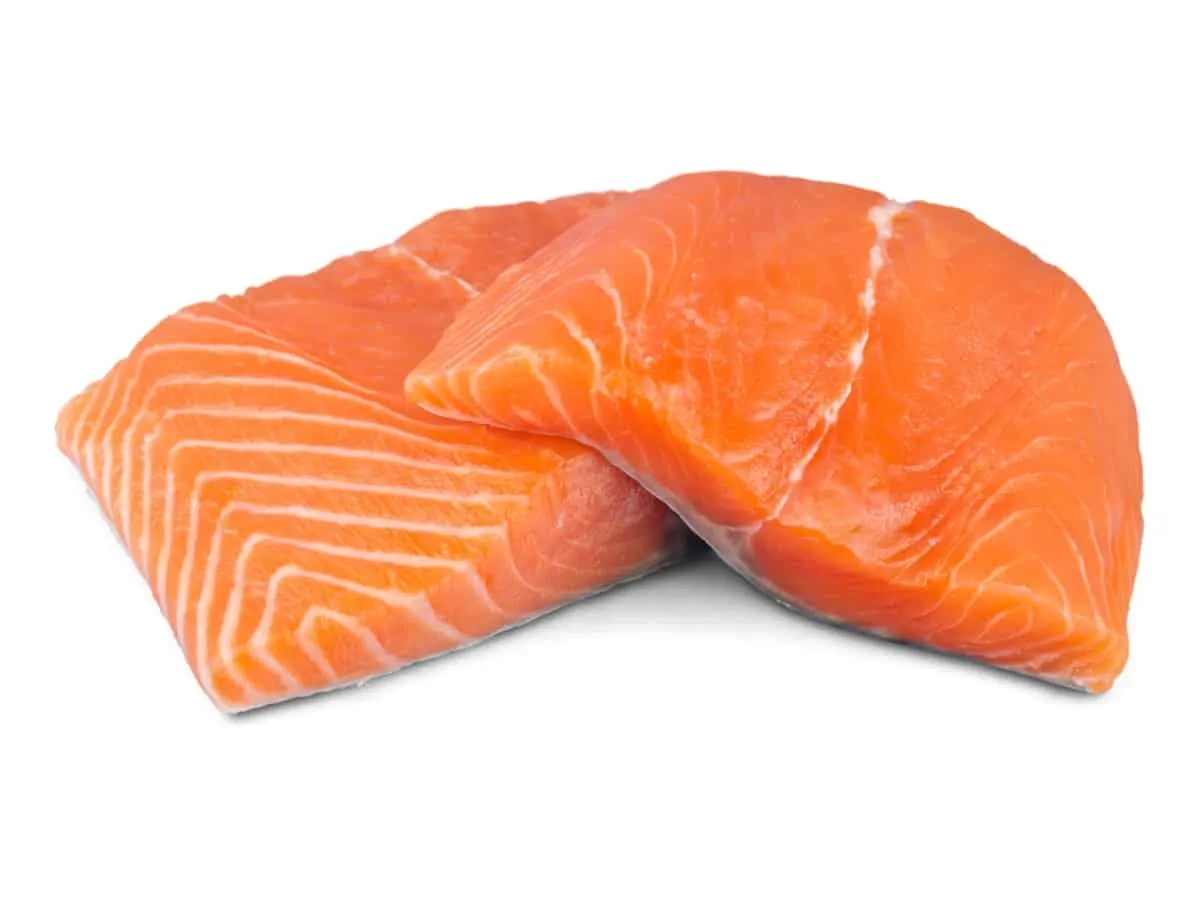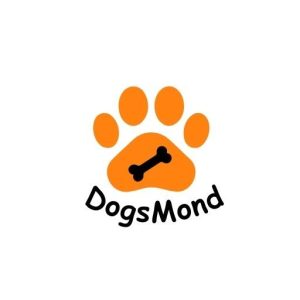Do you love salmon as much as I do? I have a Labrador who always follows me to the kitchen when I grab a pack of salmon to cook. She gives me that adorable look that makes me wonder if salmon is good for her too. After all, I don’t want to risk her health just for a tasty meal! Do you feel the same way? So, can Labradors eat salmon?
Labradors can eat salmon. It contains high levels of omega-3 fatty acids that promote healthy skin, coat, and immune function. It is also a rich source of vital proteins, vitamins, and minerals that support overall well-being. However, ensure the salmon is cooked before feeding.
To guarantee that the salmon you feed your Labrador is safe and healthy, you must follow the correct approach. Take the time to read this article carefully and make an intelligent decision before serving salmon to your furry friend.

Can Labradors Eat Salmon?
Salmon is good for Labradors. It can be an excellent protein source for your dog when prepared properly. It is rich in omega-3 fatty acids, which support a healthy coat, skin, joints, and brain function. The AKC acknowledges that salmon can decrease inflammation and is a nutrient powerhouse.
However, there are some precautions you should take when feeding salmon to your Labrador.
Salmon poisoning has been documented since 1925, according to this research study. Therefore you should always take precautions while feeding salmon to Labradors or any other foods for that matter.
Raw salmon should not be consumed since it can contain parasites that could harm your dog’s health. It has even been linked to death if treatment is not sought, according to VCA Hospitals.
This can occur if infected flukes (parasitic flatworms) implant in the dog’s intestines, whereby the bacteria enters the bloodstream. The bacteria spreads to other organs resulting in salmon poisoning.
Instead, choose boneless cooked salmon. Cooking usually kills the parasites, and boneless fish helps prevent choking hazards and digestive system injuries.
Canned varieties can also be an option, but ensure it is low in sodium and doesn’t contain any additives that may be harmful to your furry friend.
Additionally, some dogs could be allergic to or sensitive to salmon despite its many nutritional benefits. Watch out for symptoms of bad reactions in your dog, such as weakness, diarrhea, or skin irritations. Choose other protein sources if you think your Labrador may be allergic to salmon.
When introducing salmon to your Labrador’s diet, start with small amounts to gauge their tolerance and modify serving sizes accordingly.
Here’s a table with some nutritional information about salmon, as shared by the US Department of Agriculture:
| Nutrient | Amount (per 100g) |
|---|---|
| Calories | 127 kCal |
| Protein | 19.8g |
| Saturated Fatty Acids | 0.981g |
| Vitamin A | 40 IU |
| Vitamin B12 | 3.18µg |
| Carbohydrate | 0 g |
| Dietary Fiber | 0 g |

Benefits and Risks of Feeding Salmon to Labradors
Salmon is a well-known nutrient-rich food that can offer your Labrador a number of health advantages. It does, however, carry some hazards, just like any other food item.
In my experience feeding my rescue Labradors at my shelter and adjusting their meal plans, I’ve always limited the quantity of salmon due to several articles and research on salmon poisoning I’ve read in the past. For example, in this research study, salmon poisoning affected 29 dogs of different breeds, which is pretty serious.
However, does that mean all salmon is harmful?
Of course not! It has many benefits, but it totally depends on how you cook it and the immune system of your Labrador.
Let’s discuss some of the benefits and risks of including this fish in your Labrador’s diet.
Benefits of Salmon for Labradors:
- High-Quality Protein: Salmon is an excellent source of protein, which is essential for maintaining strong muscles and promoting growth in your Labrador. The protein is easily digestible, making it a great choice for dogs with sensitive stomachs.
- Improved Joint Health: Labradors are prone to joint problems, such as hip and elbow dysplasia. The omega-3 fatty acids in salmon can help to reduce inflammation in the joints, improving mobility and reducing pain.
- Omega-3 Fatty Acids: Salmon is packed with omega-3 fatty acids, which are essential for your Labrador’s skin and coat health. These fatty acids help to reduce inflammation and promote healthy skin, resulting in a shiny, lustrous coat.
- Brain Development: DHA (Docosahexaenoic Acid), a type of omega-3 fatty acid found in salmon, is crucial for your dog’s brain development and cognitive function. Regular consumption of salmon can help to improve memory, learning, and problem-solving skills.
- Boosts Immune System: Salmon is rich in antioxidants and other nutrients that can help to strengthen your Labrador’s immune system. A strong immune system can help your dog fight off illness and infections, keeping them healthy and happy.
Risks of Salmon for Labradors:
- Feeding Raw or Undercooked Salmon: Raw or undercooked salmon can cause salmon poisoning, a potentially fatal condition that can lead to vomiting, diarrhea, and dehydration. To avoid this, always cook thoroughly before feeding it to your dog.
- Allergies or Dietary Sensitivities: Some Labradors may develop allergies or sensitivities to salmon, which can cause digestive issues and skin irritations. To prevent these problems, always monitor your dog after feeding them new foods.
- Bones: Bones can pose a choking hazard or cause internal injuries if ingested by your Labrador. To prevent these issues, always remove all bones before feeding salmon to your dog. This rule applies to any meat that you serve to your dog.
- Mercury Exposure: Salmon can contain high levels of mercury, which can be harmful to your Labrador’s health if consumed in large amounts. To minimize the risk of mercury exposure, limit the amount of you feed your dog.
There’s no harm in incorporating this tasty fish into your Labrador’s diet to take advantage of the numerous health benefits it provides while being mindful of the potential risks.

Tips for Feeding Salmon to Your Labrador
TL; DR: Keep salmon cooked, boneless, and with proper portion control to ensure your Labrador enjoys the benefits without any potential risks.
Giving your Labrador salmon is a fantastic method to provide a high-quality protein source. The necessary nutrients are great for your dog’s general wellness.
Yet, not everyone is aware of how to best offer it to their Labrador and benefit from it.
“Once or twice a week, you can feed your dog salmon in various ways.”
But how?
Cooked salmon is the most common and recommended method, as raw salmon may contain harmful parasites that can affect your pet’s digestive system. Seasonings should not be added, and any bones should be completely taken out.
High-quality dog food that contains salmon as the main ingredient is another great option for your Labrador. These foods, often combined with other nutritious ingredients like sweet potato and carrots, provide a balanced diet for your dog.
Portion control is pivotal when feeding salmon to your dog. Overfeeding can lead to weight gain and unnecessary stress on the joints. It is well documented that Labradors are prone to obesity, so reducing this risk can only be a good thing.
Check out the below table to learn how much salmon you can give your Labrador according to age:
| Life Stage/Age | Amount of Salmon to Feed |
|---|---|
| Puppy (1-6 months) | 1-2 ounces per day |
| Puppy (6-12 months) | 2-4 ounces per day |
| Adult (1-7 years) | 4-8 ounces per day |
| Senior (7+ years) | 2-6 ounces per day |
Make sure to supplement the salmon with other high-quality foods to provide all the necessary nutrients for your Labrador. Incorporating different foods into your dog’s diet will ensure a well-rounded and balanced meal plan.
Avoid giving large breed supplements to your Labrador if you are feeding them a salmon-based diet, as this might result in excess nutrients and potential health problems.

Recognizing Symptoms of Salmon Intolerance or Allergy
A Labrador with a salmon allergy may display a variety of symptoms. These can include:
- Skin irritations: Redness, itching, or swelling of the skin, especially around the ears and paws.
- Digestive issues: Diarrhea, vomiting, or excessive gas.
- Ear infections: Excessive scratching or head shaking, discharge or odor from the ears.
- Paw licking or chewing: A sign of itchiness or irritation on their paws.
- Atopic dermatitis: A chronic skin condition that can cause red, inflamed, and itchy skin.
- Weakness or lethargy: Lack of energy or enthusiasm for activities they usually enjoy.
Whenever any of my dogs develops a new symptom or displays a bad reaction, I don’t panic.
Seriously!
That’s because I have an action plan formulated for each symptom that I notice in any of my Labradors. You should do the same too! It makes pet care comfortable and calm.
Here’s a table outlining some of the bad reaction signs and what to do for each sign:
| Bad Reaction Sign | What to Do |
|---|---|
| Skin irritations | Consider a hypoallergenic diet, or use topical treatments |
| Digestive issues | Offer your dog bland meals, monitor their condition, and reach out to your veterinarian if the issues persist |
| Ear infections | Have an expert examine and treat your dog’s ears |
| Paw licking or chewing | Investigate possible allergens and share with an expert to seek necessary advice |
| Atopic dermatitis | Discuss treatment options with your vet, including medication and environmental management. In most cases, a medicated bath or an over-the-counter medication is all that your Labrador needs. |
| Weakness or lethargy | Monitor your dog’s condition and note any other behavioral or physical changes to take proper action. |
In some cases, your veterinarian may advise food trials or specific allergy tests to pinpoint the exact allergen causing your Labrador’s symptoms. By identifying the cause, you can implement a treatment plan and diet that works best for your dog’s needs.
Alternatives to Salmon for Dogs
Despite the fact that salmon is a good source of protein and Omega-3 fatty acids, giving your dog the same meal every day can make him bored and perhaps cause nutrient imbalances. Let’s look at some other choices for a balanced diet for your Labrador:
- Chicken: Chicken is a common and easily accessible protein source that is both nutritious and easily digestible. It can be used as a replacement for salmon by feeding cooked, deboned chicken or adding chicken meal to your dog’s existing food.
- Turkey Meal: Turkey meal is a low-fat protein source that is ideal for dogs that are sensitive to other protein sources. It provides essential nutrients while being gentler on the stomach.
- Lamb: Lamb is another protein-rich option that provides a good mix of essential amino acids. You can introduce it into your Labrador’s diet as a lamb meal or switch to a dog food with lamb listed as the primary ingredient.
- Grains and Carbohydrates: Incorporating grains like brown rice and barley into your dog’s diet can provide essential carbohydrates and fiber. These ingredients help to maintain energy levels and support good digestion.
- Vegetables: A variety of vegetables can provide additional nutrients to your Labrador’s diet. Peas and cooked potatoes, for example, are great sources of carbohydrates and vitamins that can be added to your dog’s meals.
I have two helpful food guides for tons more options:
By offering different ingredients and flavors, you can keep your Labrador happy, healthy, and excited about mealtime.
FAQs
Can Labradors eat canned salmon?
Labradors can eat canned salmon, but it is essential to choose one without added oil, salt, or preservatives. Look for those labeled as “low-sodium” or “no salt added.” Additionally, ensure that the salmon is boneless or has soft, edible bones that pose no choking risk.
How often should I feed my Labrador salmon?
As a general guideline, you can feed your Labrador salmon once or twice a week as a treat or as part of a balanced diet. Ultimately it depends on a variety of factors, such as their age, weight, activity level, and overall health. It’s important to remember that salmon should not be the sole source of your dog’s protein, as they require a variety of nutrients from different sources.
Can Labradors eat salmon skin?
Labradors can eat salmon skin, but it should be given in moderation due to its high fat content. Although salmon skin is rich in omega-3 fatty acids that promote healthy skin and coat, overconsumption can lead to obesity and other health issues. The skin should be thoroughly cooked to prevent foodborne illnesses.
Related Posts You May Like:

